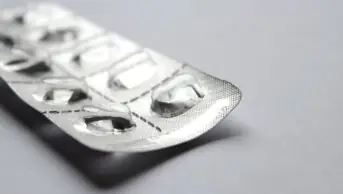
Science Photo Library
The Department of Health and Social Care (DHSC) reported 209 medicines shortages in 2019, over half of which occurred for three months or more, according to monthly updates sent to NHS providers.
Ten medicines — including an antiepileptic and a cancer treatment for children — faced supply issues for at least ten months in 2019.
The updates, obtained by The Pharmaceutical Journal, are labelled as “commercial-sensitive” and detail the names and manufacturers of medicines with new or ongoing stock issues.
The government states that the information included in the updates “is confidential to the NHS” and request that the documents not be uploaded to websites in the public domain.
An analysis of updates for every month in 2019 — excluding January and April, for which information was unavailable — revealed the names and manufacturers of 209 different products with supply issues, counting different strengths as a single product but different dosage forms as two products.
Over half of the products (109) had supply problems for three months or more, with the largest number — 95 supply issues — occurring in December 2019.
The ten products with the longest supply problems include two forms of the hypertension drug Adalat (Bayer), two forms of the anti-epileptic drug Carbagen (Mylan), hepatitis B renal vaccines (MSD) and high blood pressure medication Metoprolol – the manufacturer of which was not mentioned in the updates.
Mike Hewitson, pharmacy owner of Beaminster Pharmacy in Dorset, said the shortage of Adalat has created ”a domino effect”, which is causing replacement medicines to also become out of stock.
“It reflects the fact that in a ‘just-in-time’ system like ours you don’t really have an awful lot of capacity in the system to cope with problems,” he said.
“Most of the time, pharmacies can work around these sorts of problems, but the knock on impact on workload both for the pharmacy and for the GP practice is massive,” he continued. “From where I’m standing now, pharmacies are bearing the brunt of that impact.”
Hewitson added that although nifedipine products, like Adalat, “ought to be prescribed by brand… we’re in a world where you either take the alternative or you don’t take it at all”.
Lili Chong, a specialist pharmacist at King’s College Hospital NHS Foundation Trust, wrote in an email that the shortage of Hepatitis B renal vaccines has left “inadequate protection for low-risk patients” at the hospital.
The shortage list also includes cancer drug Erwinase, which the manufacturer, Porton Biopharma Limited (PBL), has said is indicated for acute lymphoblastic leukaemia — the most common type of leukemia in children.
In a statement, PBL said a global increase in demand for the drug has meant the company is “at the limit of current capacity”.
“PBL appreciate that this is a difficult situation for patients who urgently need our life-saving product and we are committed to working to address this,” they said, adding that production is now running at all times.
Mylan did not give a reason for the supply issues surrounding its anti-epilepsy product Carbagen (carbamazepine), but said it was ”reviewing future supply forecasting regularly”.
A spokesperson for Epilepsy Action, a UK charity that provides support for people with epilepsy, told The Pharmaceutical Journal that the Carbagen shortages were “highly concerning”.
“Knowing there are such shortages and possibly having to switch medicines can cause a great deal of anxiety for people with epilepsy, as well as potentially affect their seizure control,” she said, adding that the DHSC had written to prescribers recommending they switch people with epilepsy to Tegretol — another brand of carbamazepine.
“We don’t know if this has caused anyone difficulties,” she said.
“As carbamazepine is classed as a Category 1 medicine, the Medicines and Healthcare products Regulatory Agency advises patients stay on a specific manufacturer’s product.”
Changes to epilepsy medicines can lead to breakthrough seizures, worsening of seizure control or increasing side effects, which can be life-threatening, she continued.
The DHSC told The Pharmaceutical Journal that the ongoing issues with the ten products were mainly due to manufacturing issues, including problems accessing the raw pharmaceutical ingredients as well as commercial decisions made by some companies to divest products to another firm.
In January 2019, the government introduced a mandatory requirement for manufacturers to report supply issues in the Health Service Products (Provision and Disclosure of Information) Regulations 2018.
A spokesperson for the DHSC said: “We understand the concerns some people have around availability of medicines and we are doing everything we can to ensure patients have access to safe and effective treatments.”
In response to questions from The Pharmaceutical Journal on the reasons for the prolonged supply issues, a spokesperson for hepatitis B and rabies vaccine manufacturer GSK said demand for its vaccines “is consistently higher than the number of doses we are able to produce”.
“Over the course of the past 12 months, GSK temporarily suspended the release of hepatitis B and rabies vaccines from its vaccine manufacturing sites as it investigated some manufacturing issues,” the spokesperson said, adding that the investigations have now finished.
Bayer added that delays in the production of Adalat LA prolonged release tablets were “caused by ongoing remediation and modernisation activities at our supply centre in Leverkusen, Germany”. However, Adalat Retard tablets have been discontinued.
Full list of the ten products facing extended supply issues:
- Adalat LA prolonged release;
- Adalat Retard modified release tablets;
- Carbagen immediate release tablets;
- Carbagen modified release tablets;
- Erwinase;
- Hepatitis B renal vaccines;
- Metoprolol tablets;
- Rabipur;
- Tetracosactide 1mg depot injection;
- Trifluoperazine tablets.


